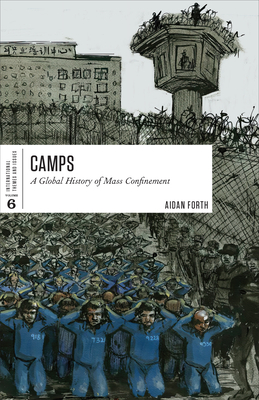

 University of Toronto Press
University of Toronto Press
Camps: A Global History of Mass Confinement


Key Metrics
- Aidan Forth
- University of Toronto Press
- Paperback
- 9781487588281
- 8.5 X 5.5 X 1 inches
- -
- History > Military - Wars & Conflicts (Other)
- English
 Secure Transaction
Secure TransactionBook Description
The concentration of potentially dangerous populations - terrorists, political suspects, ethnic minorities, prisoners of war, enemy aliens - spans the modern era. The spectre of Nazi concentration camps and the Soviet Gulag obscures the lasting and widespread use of camps by other regimes. From Konzentrationslager in colonial Africa to strategic villages in Southeast Asia, from slave plantations in America to Uyghur sweatshops in Xinjiang, and from civilian internment in World War II to extraordinary rendition at Guantanamo Bay, mass detention - behind barbed wire, brick walls, or bamboo fences, or amid vast stretches of desert or ocean - is as diverse as it is ubiquitous.
Camps testify to the modern state's capacity for violence. But they also highlight alternate histories of humanitarian containment, whether for refugees, the poor, or other distressed groups. Located at the intersection between sympathy and security, such institutions highlight ongoing challenges to human rights and conflict management. Camps offers a short but compelling guide to the varied manifestations of concentration camps in the last two centuries, while tracing provocative transnational connections with related institutions like workhouses, migrant detention centres, and residential schools.
Author Bio
Aidan Forth’s teaching and research explore European empires as venues of violence and warfare; humanitarian intervention; and the rich cross-fertilization of cultures, identities and ideas that have shaped the modern world. His prize-winning first book Barbed-Wire Imperialism: Britain’s Empire of Camps, 1876-1903 reveals a global but hitherto unexplored network of refugee and concentration camps established by Britain in the late nineteenth century.
Based on archival research on four different continents, Barbed-Wire Imperialism pioneered an interdisciplinary, comparative and transnational approach to trace a genealogy of the camp as an institution deeply embedded in the politics and culture of the Euro-American world.
As barbed-wire camps proliferate in our own era, from the US-Mexican border to the global south, Dr. Forth is now writing a new classroom-oriented volume titled Camps: Mass Confinement in the Modern World for the University of Toronto Press. He is also conducting preliminary research for a new monograph titled The Passage East, which examines the technologies and ideologies of migration and cross-cultural interaction as they developed globally in the long nineteenth century.
Whether in the classroom, the archives or at conferences and public talks, Dr. Forth prizes the contributions of students to his evolving interests: he hopes to instill in them his own passion for history, and he fully expects that his classroom interactions at MacEwan will enrich his own understanding of the past.
Prior to coming to MacEwan, Dr. Forth was a teaching fellow at Stanford University and an Associate Professor at Loyola University, Chicago.
Source: MacEwan University
Videos


Community reviews
Write a ReviewNo Community reviews